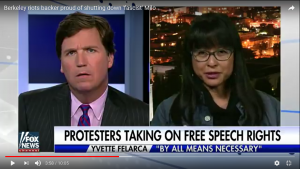
(The Canadian Criminal Code, which typically gets amended every year)
Criminal offences in Canada are categorized like this
SUMMARY OFFENCE: more minor, lesser penalties (misdemeanor)
INDICTABLE OFFENCE: more serious, harsher penalties (felony)
HYBRID OFFENCE: Prosecutor has discretion as to proceed “summarily” or “by indictment”
For a good video on this subject, Julie Mora posted a video seen here. It had 2 parts: (a) an expanded gun registry, Bill C-71, and (b) changes to the Canadian Criminal Code, Bill C-75. Julie is a fine blogger, and her videos are well worth a watch by all Canadians. She claims in this video that the bill will “hybridize” many serious charges, meaning that they may now be tried summarily. And she is right. Below are the major points.
This is not trivial at all. Terrorism and rioting offence should be treated seriously. Yet, if this bill were actually to pass, the penalties for serious crimes may be gutted. True, for hybrid offences, Prosecutors could still choose to try the case by indictment. However, most people would agree that the option should not exist
Relevant links are below:
CLICK HERE for the Criminal Code as it currently exists.
CLICK HERE for the Liberal Bill C-75.
ORIGINAL
Marginal note:
Punishment of rioter
65 (1) Every one who takes part in a riot is guilty of an indictable offence and liable to imprisonment for a term not exceeding two years.
Marginal note:
Concealment of identity
(2) Every person who commits an offence under subsection (1) while wearing a mask or other disguise to conceal their identity without lawful excuse is guilty of an indictable offence and liable to imprisonment for a term not exceeding 10 years.
REPLACEMENT
Punishment of rioter
65 (1) Every person who takes part in a riot is guilty of
(a) an indictable offence and liable to imprisonment for a term of not more than two years; or
(b) an offence punishable on summary conviction.
Concealment of identity
(2) Every person who commits an offence under subsection (1) while wearing a mask or other disguise to conceal their identity without lawful excuse is guilty of
(a) an indictable offence and liable to imprisonment for a term of not more than years; or
(b) an offence punishable on summary conviction.
ORIGINAL
Neglect by peace officer
69 A peace officer who receives notice that there is a riot within his jurisdiction and, without reasonable excuse, fails to take all reasonable steps to suppress the riot is guilty of an indictable offence and liable to imprisonment for a term not exceeding two years.
REPLACEMENT
Neglect by peace officer
69 A peace officer who receives notice that there is a riot within their jurisdiction and, without reasonable excuse, fails to take all reasonable steps to suppress the riot is guilty of
(a) an indictable offence and liable to imprisonment for a term of not more than two years; or
(b) an offence punishable on summary conviction.
ORIGINAL
Possession without lawful excuse
82 (1) Every person who, without lawful excuse, the proof of which lies on the person, makes or has in the possession or under the care or control of the person any explosive substance is guilty of an indictable offence and liable to imprisonment for a term not exceeding five years.
REPLACEMENT
14 Subsection 82(1) of the Act is replaced by the following:
Possession of explosive
82 (1) Every person who, without lawful excuse, makes or has in their possession or under their care or control any explosive substance is guilty of
(a) an indictable offence and liable to imprisonment for a term of not more than five years; or
(b) an offence punishable on summary conviction.
ORIGINAL
Financing of Terrorism
Marginal note:
Providing or collecting property for certain activities
83.02 Every one who, directly or indirectly, wilfully and without lawful justification or excuse, provides or collects property intending that it be used or knowing that it will be used, in whole or in part, in order to carry out
(a) an act or omission that constitutes an offence referred to in subparagraphs (a)(i) to (ix) of the definition of terrorist activity in subsection 83.01(1), or
(b) any other act or omission intended to cause death or serious bodily harm to a civilian or to any other person not taking an active part in the hostilities in a situation of armed conflict, if the purpose of that act or omission, by its nature or context, is to intimidate the public, or to compel a government or an international organization to do or refrain from doing any act,
is guilty of an indictable offence and is liable to imprisonment for a term of not more than 10 years.
REPLACEMENT
Providing or collecting property for certain activities
83.02 Every person is guilty of an indictable offence and liable to imprisonment for a term of not more than 10 years or is guilty of an offence punishable on summary conviction who, directly or indirectly, wilfully and without lawful justification or excuse, provides or collects property intending that it be used or knowing that it will be used, in whole or in part, in order to carry out
(a) an indictable offence and liable to imprisonment for a term of not more than five years; or
(b) an offence punishable on summary conviction.
ORIGINAL
Providing, making available, etc., property or services for terrorist purposes
83.03 Every one who, directly or indirectly, collects property, provides or invites a person to provide, or makes available property or financial or other related services
(a) intending that they be used, or knowing that they will be used, in whole or in part, for the purpose of facilitating or carrying out any terrorist activity, or for the purpose of benefiting any person who is facilitating or carrying out such an activity, or
(b) knowing that, in whole or part, they will be used by or will benefit a terrorist group,
is guilty of an indictable offence and is liable to imprisonment for a term of not more than 10 years.
REPLACEMENT
Providing, making available, etc., property or services for terrorist purposes
83.03 Every person is guilty of an indictable offence and liable to imprisonment for a term of not more than 10 years or is guilty of an offence punishable on summary conviction who, directly or indirectly, collects property, provides or invites a person to provide, or makes available property or financial or other related services
(a) an indictable offence and liable to imprisonment for a term of not more than five years; or
(b) an offence punishable on summary conviction.
ORIGINAL
Using or possessing property for terrorist purposes
83.04 Every one who
(a) uses property, directly or indirectly, in whole or in part, for the purpose of facilitating or carrying out a terrorist activity, or
(b) possesses property intending that it be used or knowing that it will be used, directly or indirectly, in whole or in part, for the purpose of facilitating or carrying out a terrorist activity,
is guilty of an indictable offence and is liable to imprisonment for a term of not more than 10 years.
REPLACEMENT
Using or possessing property for terrorist purposes
83.04 Every person is guilty of an indictable offence and liable to imprisonment for a term of not more than 10 years or is guilty of an offence punishable on summary conviction
ORIGINAL
Offences — freezing of property, disclosure or audit
83.12 (1) Every one who contravenes any of sections 83.08, 83.1 and 83.11 is guilty of an offence and liable
(a) on summary conviction, to a fine of not more than $100,000 or to imprisonment for a term of not more than one year, or to both; or
(b) on conviction on indictment, to imprisonment for a term of not more than 10 years.
REPLACEMENT
Paragraphs 83.12(1)(a) and (b) of the Act are replaced by the following:
(a) on conviction on indictment, to imprisonment for a term of not more than 10 years; or
(b) on summary conviction, to a fine of not more than $100,000 or to imprisonment for a term of not more than two years less a day, or to both.
ORIGINAL
Participation in activity of terrorist group
83.18 (1) Every one who knowingly participates in or contributes to, directly or indirectly, any activity of a terrorist group for the purpose of enhancing the ability of any terrorist group to facilitate or carry out a terrorist activity is guilty of an indictable offence and liable to imprisonment for a term not exceeding ten years.
REPLACEMENT
Participation in activity of terrorist group
83.18 (1) Every person who knowingly participates in or contributes to, directly or indirectly, any activity of a terrorist group for the purpose of enhancing the ability of any terrorist group to facilitate or carry out a terrorist activity is guilty of
(a) an indictable offence and liable to imprisonment for a term of not more than10 years; or
(b) an offence punishable on summary conviction.
ORIGINAL
Leaving Canada to participate in activity of terrorist group
83.181 Everyone who leaves or attempts to leave Canada, or goes or attempts to go on board a conveyance with the intent to leave Canada, for the purpose of committing an act or omission outside Canada that, if committed in Canada, would be an offence under subsection 83.18(1) is guilty of an indictable offence and liable to imprisonment for a term of not more than 10 years
REPLACEMENT
21 Section 83.181 of the Act is replaced by the following:
Leaving Canada to participate in activity of terrorist group
83.181 Every person who leaves or attempts to leave Canada, or goes or attempts to go on board a conveyance with the intent to leave Canada, for the purpose of committing an act or omission outside Canada that, if committed in Canada, would be an offence under subsection 83.18(1) is guilty of
(a) an indictable offence and liable to imprisonment for a term of not more than 10 years; or
(b) an offence punishable on summary conviction.
ORIGINAL
Advocating or promoting commission of terrorism offences
83.221 (1) Every person who, by communicating statements, knowingly advocates or promotes the commission of terrorism offences in general — other than an offence under this section — while knowing that any of those offences will be committed or being reckless as to whether any of those offences may be committed, as a result of such communication, is guilty of an indictable offence and is liable to imprisonment for a term of not more than five years.
REPLACEMENT
22 Subsection 83.221(1) of the Act is replaced by the following:
Advocating or promoting commission of terrorism offences
83.221 (1) Every person who, by communicating statements, knowingly advocates or promotes the commission of terrorism offences in general — other than an offence under this section — while knowing that any of those offences will be committed or being reckless as to whether any of those offences may be committed, as a result of such communication, is guilty of
(a) an indictable offence and liable to imprisonment for a term of not more than five years; or
(b) an offence punishable on summary conviction
ORIGINAL
Concealing person who carried out terrorist activity
83.23 (1) Everyone who knowingly harbours or conceals any person whom they know to be a person who has carried out a terrorist activity, for the purpose of enabling the person to facilitate or carry out any terrorist activity, is guilty of an indictable offence and liable to imprisonment
(a) for a term of not more than 14 years, if the person who is harboured or concealed carried out a terrorist activity that is a terrorism offence for which that person is liable to imprisonment for life; and
(b) for a term of not more than 10 years, if the person who is harboured or concealed carried out a terrorist activity that is a terrorism offence for which that person is liable to any other punishment.
REPLACEMENT
Concealing person who carried out terrorist activity
83.23 (1) Every person who knowingly harbours or conceals another person whom they know to be a person who has carried out a terrorist activity, for the purpose of enabling that other person to facilitate or carry out any terrorist activity, is guilty of
(a) an indictable offence and liable to imprisonment for a term of not more than 14 years, if the person who is harboured or concealed carried out a terrorist activity that is a terrorism offence for which that person is liable to imprisonment for life; and
(b) an indictable offence and liable to imprisonment for a term of not more than 10 years or an offence punishable on summary conviction, if the person who is harboured or concealed carried out a terrorist activity that is a terrorism offence for which that person is liable to any other punishment.
ORIGINAL
Concealing person who is likely to carry out terrorist activity
(2) Everyone who knowingly harbours or conceals any person whom they know to be a person who is likely to carry out a terrorist activity, for the purpose of enabling the person to facilitate or carry out any terrorist activity, is guilty of an indictable offence and liable to imprisonment for a term of not more than 10 years.
REPLACEMENT
Concealing person who is likely to carry out terrorist activity
(2) Every person who knowingly harbours or conceals another person whom they know to be a person who is likely to carry out a terrorist activity, for the purpose of enabling that other person to facilitate or carry out any terrorist activity, is guilty of
(a) an indictable offence and liable to imprisonment for a term of not more than 10 years; or
(b) an offence punishable on summary conviction
ORIGINAL
Person to be brought before judge
(3) A peace officer who arrests a person in the execution of the warrant shall, without delay, bring the person, or cause them to be brought, before the judge who issued the warrant or another judge of the same court. The judge in question may, to ensure compliance with the order, order that the person be detained in custody or released on recognizance, with or without sureties.
REPLACEMENT
25 Subsection 83.29(3) of the Act is replaced by the following:
Person to be brought before judge
(3) A peace officer who arrests a person in the execution of a warrant shall, without delay, bring the person, or cause the person to be brought, before the judge who issued the warrant or another judge of the same court. The judge in question may, to ensure compliance with the order, order that the person be detained in custody or make a release order, the form of which may be adapted to suit the circumstances
[Note: the new wording is such that is seems intended to make it easier to release suspected terrorists]
ORIGINAL
Possession of prohibited or restricted firearm with ammunition
Punishment
(2) Every person who commits an offence under subsection (1)
(a) is guilty of an indictable offence and liable to imprisonment for a term not exceeding 10 years and to a minimum punishment of imprisonment for a term of
(i) in the case of a first offence, three years, and
(ii) in the case of a second or subsequent offence, five years; or
(b) is guilty of an offence punishable on summary conviction and liable to imprisonment for a term not exceeding one year.
REPLACEMENT
27 Paragraph 95(2)(b) of the Act is replaced by the following:
(b) is guilty of an offence punishable on summary conviction.
ORIGINAL
Possession of weapon obtained by commission of offence
96 (1) Subject to subsection (3), every person commits an offence who possesses a firearm, a prohibited weapon, a restricted weapon, a prohibited device or any prohibited ammunition that the person knows was obtained by the commission in Canada of an offence or by an act or omission anywhere that, if it had occurred in Canada, would have constituted an offence.
Marginal note:
Punishment
(2) Every person who commits an offence under subsection (1)
(a) is guilty of an indictable offence and liable to imprisonment for a term not exceeding ten years and to a minimum punishment of imprisonment for a term of one year; or
(b) is guilty of an offence punishable on summary conviction and liable to imprisonment for a term not exceeding one year.
REPLACEMENT
28 Paragraph 96(2)(b) of the Act is replaced by the following:
(b) is guilty of an offence punishable on summary conviction.
As absurd as it sounds, here is the “SUMMARY” of Bill C-75.
SUMMARY
This enactment amends the Criminal Code to, among other things,
(a) modernize and clarify interim release provisions to simplify the forms of release that may be imposed on an accused, incorporate a principle of restraint and require that particular attention be given to the circumstances of Aboriginal accused and accused from vulnerable populations when making interim release decisions, and provide more onerous interim release requirements for offences involving violence against an intimate partner;
(b) provide for a judicial referral hearing to deal with administration of justice offences involving a failure to comply with conditions of release or failure to appear as required;
(c) abolish peremptory challenges of jurors, modify the process of challenging a juror for cause so that a judge makes the determination of whether a ground of challenge is true, and allow a judge to direct that a juror stand by for reasons of maintaining public confidence in the administration of justice;
(d) increase the maximum term of imprisonment for repeat offences involving intimate partner violence and provide that abuse of an intimate partner is an aggravating factor on sentencing;
(e) restrict the availability of a preliminary inquiry to offences punishable by imprisonment for life and strengthen the justice’s powers to limit the issues explored and witnesses to be heard at the inquiry;
(f) hybridize most indictable offences punishable by a maximum penalty of 10 years or less, increase the default maximum penalty to two years less a day of imprisonment for summary conviction offences and extend the limitation period for summary conviction offences to 12 months;
(g) remove the requirement for judicial endorsement for the execution of certain out-of-province warrants and authorizations, expand judicial case management powers, allow receiving routine police evidence in writing, consolidate provisions relating to the powers of the Attorney General and allow increased use of technology to facilitate remote attendance by any person in a proceeding;
(h) allow the court to exempt an offender from the requirement to pay a victim surcharge if the offender satisfies the court that the payment would cause the offender undue hardship, provide the court with guidance as to what constitutes undue hardship, provide that a victim surcharge is to be paid for each offence, with an exception for certain administration of justice offences if the total amount of surcharges imposed on an offender for those types of offences would be disproportionate in the circumstances, require courts to provide reasons for granting any exception for certain administration of justice offences or any exemption from the requirement to pay a victim surcharge and clarify that the amendments described in this paragraph apply to any offender who is sentenced after the day on which they come into force, regardless of whether or not the offence was committed before that day; and
(i) remove passages and repeal provisions that have been ruled unconstitutional by the Supreme Court of Canada, repeal section 159 of the Act and provide that no person shall be convicted of any historical offence of a sexual nature unless the act that constitutes the offence would constitute an offence under the Criminal Code if it were committed on the day on which the charge was laid.
The enactment also amends the Youth Criminal Justice Act in order to reduce delays within the youth criminal justice system and enhance the effectiveness of that system with respect to administration of justice offences. For those purposes, the enactment amends that Act to, among other things,
(a) set out principles intended to encourage the use of extrajudicial measures and judicial reviews as alternatives to the laying of charges for administration of justice offences;
(b) set out requirements for imposing conditions on a young person’s release order or as part of a sentence;
(c) limit the circumstances in which a custodial sentence may be imposed for an administration of justice offence;
(d) remove the requirement for the Attorney General to determine whether to seek an adult sentence in certain circumstances; and
(e) remove the power of a youth justice court to make an order to lift the ban on publication in the case of a young person who receives a youth sentence for a violent offence, as well as the requirement to determine whether to make such an order.
Finally, the enactment amends among other Acts An Act to amend the Criminal Code (exploitation and trafficking in persons) so that certain sections of that Act can come into force on different days and also makes consequential amendments to other Acts.
Bill C-75 is too long to possibly cover entirely in one article, though this is the most serious of it.
Having much smaller bills introduced would certainly be preferable. Far too often, governments ram through much unrelated material into a bill, called “omnibus bills”, such that proper debate never actually happens.
A more thorough debate could be had if this were broken up into 6-8 separate bills
And just reiterate, terrorism and other major crimes should always be tried by indictment.
Like this:
Like Loading...






